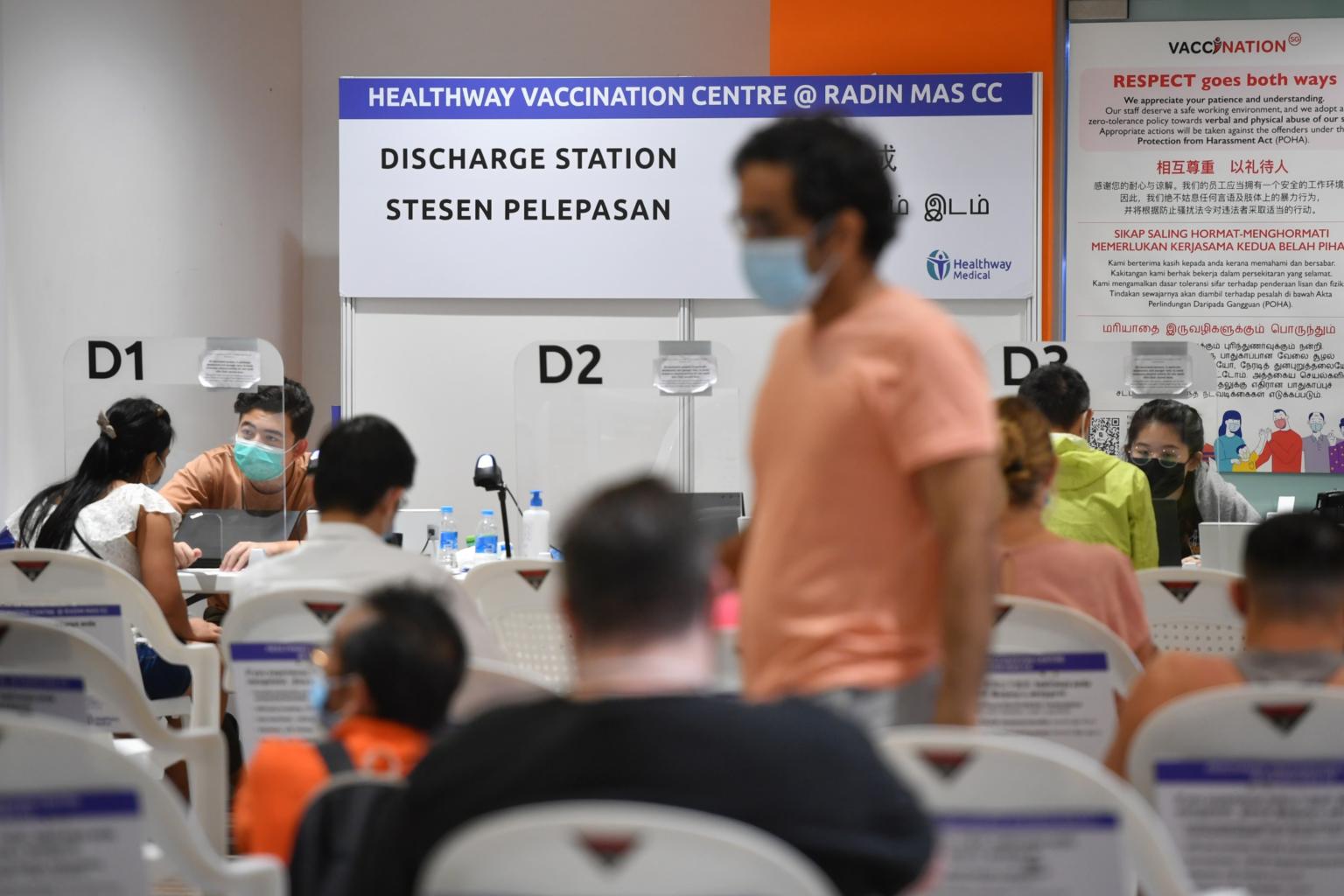Employers should not make Covid-19 vaccination a must, but may do so for staff in higher-risk settings
Sign up now: Get ST's newsletters delivered to your inbox

Employers cannot fire existing staff on the ground of declining vaccination.
ST PHOTO: CHONG JUN LIANG
SINGAPORE - Employers should not make Covid-19 vaccination mandatory for staff, but those in higher-risk settings may make vaccination a requirement as part of company policy.
They may impose this vaccination requirement at the point of recruitment or advertisement for new hires into work settings where employees are considered to have a higher risk of Covid-19 infection. But they cannot fire existing staff on the grounds of declining vaccination.
These guidelines were outlined in an advisory issued by the Ministry of Manpower (MOM), the National Trades Union Congress (NTUC) and the Singapore National Employers Federation (SNEF) on Friday (July 2), as Singapore looks to accelerate vaccination across the population.
While employers should not make Covid-19 vaccination compulsory, in line with Singapore's national vaccination policy, they should strongly encourage and facilitate medically eligible staff to get inoculated.
They may also ask their workers for their vaccination status for business purposes such as business continuity planning, but staff who decline vaccination should not be penalised, the advisory stated.
However, employers may require vaccination as a company policy in higher-risk employment settings, where staff have a higher chance of exposure to Covid-19, live in communal environments, or operate in a place which does not allow for safe management measures to be effective or carried out.
These include workers who live in dormitories, who are in regular contact with Covid-19 patients, air crew, and those in the construction, marine and process sectors.
The advisory noted that a useful reference point in assessing if an employee works in a higher-risk setting is whether the worker is required to undergo rostered routine testing (RRT), mandated fast and easy testing (FET), or is in regular contact with known Covid-19 cases or those isolated due to infection risk.
Workers in sectors such as construction, marine offshore and process, as well as maritime, are required to undergo RRT, while FET will be mandatory for staff in settings with unmasked clients or patrons, such as dine-in food and beverage establishments and personal care services.
Employers who wish to make vaccination compulsory in these higher-risk employment settings may adopt several measures for staff who decline vaccination.
They may redeploy such workers to other suitable jobs with lower risk of Covid-19 infection. But terms and conditions for redeployment should be mutually agreed upon between bosses and staff if there are no existing redeployment policies within the organisation.
Employers may recover Covid-19 related costs such as testing or stay-home notice (SHN) accommodation expenses incurred from workers who decline vaccination which are over and above the costs incurred for vaccinated staff in similar deployment settings, the advisory said.
The advisory did not spell out what these costs are, but it said that they can be recovered either through salary deductions or requiring the employee to pay the relevant service provider directly.
Employers may also adopt a differentiated leave policy for vaccinated employees versus those who decline inoculation, such as by putting those who choose not to be vaccinated on no-pay leave for the duration of SHN served.
The union and the employer may mutually agree on other measures to be taken for staff who decline vaccination, the advisory said.
The MOM, NTUC and SNEF stressed that employers should under no circumstances terminate or threaten to terminate an employee's service on the basis of declining vaccination.
Employers who make Covid-19 vaccination a requirement should also provide affected employees with additional paid sick leave to support their recovery from any immediate adverse medical complications arising from vaccination.
They should also exempt staff who are deemed unsuitable for vaccination or not yet scheduled for their jabs from the vaccination requirement in higher-risk settings, the advisory said.
The tripartite partners also stressed that employers who make vaccination a requirement are expected to communicate clearly to employees that they will not be penalised or have their employment terminated because they decline Covid-19 vaccination.
Employers should also explain why vaccination is made a requirement, and make reasonable efforts to find out why staff decline to get inoculated and address their concerns, said the tripartite partners.
Employers should also inform staff of measures taken for workers who decline vaccination and assistance offered to those who suffer from adverse complications arising from the vaccination requirement.


